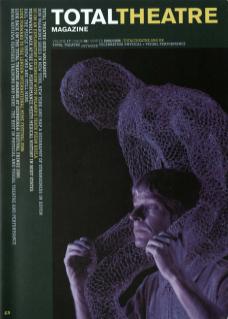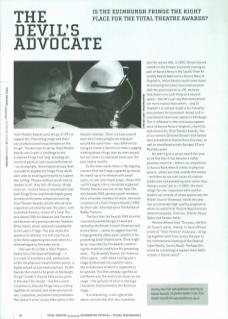Total Theatre Awards were set up in 1997 to support the 'flourishing range and diversity of physical and visual theatre on the Fringe'. The decision to set up Total Theatre Awards was in part a challenge to the Scotsman Fringe First long-standing dismissal of physical and visual performance – as an example, mime had previously been excluded as eligible for Fringe Firsts which were seen as existing principally to support new writing. Theatre without words was no theatre at all, they felt. Of course, things move on – and we have in recent years seen both Fringe Firsts and Herald Angels going to many of the same companies winning Total Theatre Awards, artists who we have supported consistently over the years, such as Andrew Dawson, winner of a Total Theatre Award 2005 for Absence and Presence and director of a previous winner, Pandora 88 by Fabrik, which returned triumphantly to this year's Fringe. This now raises the question of whether it is still vital for us to be there supporting this work when it is acknowledged by the wider world.
The case for is that a Total Theatre Award has a life beyond Edinburgh – it is a mark of excellence and, particularly within the physical/visual theatre sector, is highly valued as a promotional tool. Do the Awards then need to be given at Edinburgh Fringe? Couldn't they be held at any point in the year? Yes maybe – but the current consensus is that the Fringe sees a coming together of national and international artists, companies, promoters and presenters that doesn't occur at any other point in the theatre calendar. There is a buzz around work which many people are seeing at around the same time – very different to trying to create a shortlist or have a judging meeting about things seen by some people but not others at scattered times over the past twelve months.
On the other hand, there is the ongoing concern that the Fringe is geared up mostly for stand-up or for theatre with small casts, no sets and simple props; shows that can fit happily into a converted cupboard. Mischa Twitchin was one of the Total Theatre Awards 2005 advisory panel members. He is a founder-member of Shunt, who were recipients of a Total Theatre Award in 2000 for their site-informed piece The Ballad of Bobby Francois:
'The fact that the Awards 2005 shortlist consisted overwhelmingly of work presented by the British Council Showcase and Aurora Nova... seems to suggest that the Fringe generally offers poor conditions for presenting total theatre work. There might be an issue then for the Awards concerning the material conditions for presenting work... The Assembly Rooms, for instance, offers space... with raked seating and a stage shoehorned into opulent rooms, the architecture of which is supposed to be ignored. This then already signifies an indifference to the work to be shown on the stage – the epitome of which is the huge chandelier that dominates the Ballroom stage...'
It is interesting, in the light of the above, to note that this very chandelier was the reason why, in 2003, Derevo moved Islands in the Stream (currently touring as part of Aurora Nova in the South) from Assembly Rooms Ballroom to Aurora Nova St Stephen's, where Derevo could come closer to achieving the total visual environment that the piece aspires to. OK, we know that there is no such thing as a neutral space – but let's just say that some places are more neutral than others – and St Stephen's is without doubt a far friendlier environment for movement-based and visual theatre than most spaces in Edinburgh. This is reflected in the continuous appearance of Aurora Nova in longlists, shortlists and winners for Total Theatre Awards. Two of our winners (Andrew Dawson and Gecko) were presented at Aurora Nova this year, as well as shortlisted artists Rainpan 43 and Matilda Leyser.
We didn't give a venue award this year as we felt that it has become a rather pointless exercise – there's no competition to Aurora Nova when it comes to physical spaces, unless you step outside the venues – and then we are into issues of creative production and presenting work rather than 'being a venue' per se. In 2005, the main refuge for site-responsive work and for theatre set outside of venue spaces was the British Council Showcase, which this year was an extremely high-quality programme which included Total Theatre Award winners dreamthinkspeak, Grid Iron, Station House Opera and Kazuko Hohki.
Mischa reflects that 'This year, the British Council seems, indeed, to have offered a kind of "Total Theatre" showcase-bringing together work from across the year to the international meeting of the Festival (specifically, Aurora Nova). Perhaps this would be something to explore more deliberately in future years?'
Dorothy Max Prior with additional reporting by Mischa Twitchin. For further details on the Total Theatre Awards see www.totaltheates.org.uk

